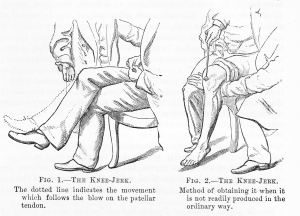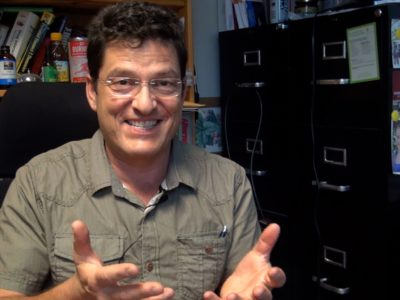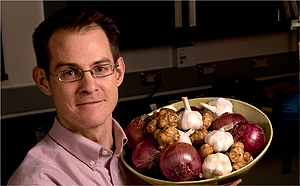- Ron Rosedale – Fiber – Need It or Not?
- The American Gut Project
- Justin Sonnenburg – Fiber & “Starving our Microbial Self”
- Alberto Martin – Carbohydrates and Colon Cancer
- Eric Westman MD – Low Carb, Health & the Microbiome
In this interview, Dr. Eric Westman of Duke University will talk about how a low-carb, high fat, ketogenic diet affects health, including the health of our digestion and the trillions of microbes that live inside our guts. Eric is currently the president of the American Society of Bariatric Physicians. He’s co-editor of the medical textbook, Obesity: Evaluation and Treatment Essentials. He’s co-author of The New Atkins for a New You, Cholesterol Clarity and Keto Clarity. As for the human microbiome – it’s increasingly clear that our gut microbes may influence many aspects of our health, and there’s plenty to learn about this. Little research has looked at how a ketogenic diet affects our microbes, and most microbiome scientists urge that we need more data before jumping to conclusions about the “best” way to eat. Eric Westman sees so many people discover better health on a ketogenic diet, he suspect their “microbes” are doing fine. As for some clinicians and bloggers who warn that a ketogenic diet does not provide enough fiber to make a “healthy” microbiome, Eric has a different point of view. Here’s a transcript of this conversation with Eric Westman.
“Different” Isn’t Always “Bad”
ERIC WESTMAN – You know, there’s a knee jerk reaction to claim that if something’s different than what we’ve seen before, that it must necessarily be bad. And that reaction, we’ve seen in the low carb, high fat diet world quite a bit. For instance, the findings, when the studies were finally done on low carb high fat diets (15 years ago), the data showed a ketogenic diet actually reduced cardiometabolic risk, but just by a different mechanism than how a low fat diet affects heart health. Everyone assumed a high-fat, ketogenic diet would be bad for heart health, and it turns out, it’s not bad.
Regarding the microbiome, I do recall one study published about low fat high carb diets in humans where the gut flora changed quite a bit, and there was concern because the bacteria that produced the butyrate, which is the fatty acid similar to ketone bodies, butyrate went down on the low carb diet. Classically, it’s taught that the colon cells, the cells of the large intestine, have to have the fuel, or basically ketones, from inside the lumen, meaning from inside the intestine itself. But those teaching this concept had basically forgotten that on a low carb high fat diet, the ketones go up in the bloodstream, which is another way to feed the cells of the colon. If you only looked at it in one way, that the ketone production went down inside the intestine itself, therefore it’s bad, well they forgot to look a little further and understand that actually the ketone levels go up in the blood and probably can nourish the cells just as well, if not better, than from the bacteria in the gut itself But I have to say, there are very few studies looking in detail at the gut microbiome of people on a truly high fat, low carb diet. On the other hand, we’ve had a lot of experience talking to people who’ve been on low carbohydrate high fat diets for health reasons.
SHELLEY – Can you say more about the studies looking at how gut health is maintained, even when microbes in the gut are not making butyrate?
ERIC WESTMAN – One study was out of England. There’s another one out of Australia to look at the flora or the gut micro biome of people on low carb high fat diets. But clinically, we do see changes that probably involve shifts of microbes. When you talk to people who follow the low carb high fat diets, certainly there’s a reduction in the amount of stool, the amount of bowel movements, and also the reduction in how often they go to have a bowel movement. Now some people are so fixated in having a regular bowel movement, these changes concern them. There’s quite a wide variation in how frequently people have bowel movements, when they switch to a low carb, high fat diet. Some people do get diarrhea or loose stools, but most people, if anything, about 90% of people have harder to pass stools and less flatulence, less bowel gas. I’m taught that it’s the large intestinal bacteria that actually produce the gas. So when people shift to a low-carb, high fat diet, there’s a change in the production of bacteria in the colon, no question about it. If I can infer that having less bowel movement and then having less gas is what I see clinically, then I’m pretty confident there’s a big change in the colonic bacteria. Not that it’s bad, but there’s just going to be a change. So it doesn’t surprise me.
“Starving Our Microbial Self” – maybe in mice, not in ketogenic people
SHELLEY – I talked with Justin Sonnenburg, who recently wrote an essay in Cell titled, “Starving Our Microbial Self,” based in part on some of the remarkable studies he’s doing in mice. He cautioned that if the microbes in the gut don’t get adequate food for themselves, they not only stop creating the butyric acid the intestinal cells like, but the microbes may start to devour the mucus gel that protects the intestinal lining, and they may even start digging into the intestinal lining itself, as food. That might explain why, in Justin’s words, he says that many studies indicate more colitis and inflammatory bowel disease in people on a high fat diet.
ERIC WESTMAN – Well, there are a couple of things I would call into question with those comments. Not having talked with him directly. Just because something is different from what we see doesn’t mean it’s bad. In fact the gut micro biome of people on a low-carb, high fat, ketogenic diet may be healthier than what we see in the typical American Diet. We don’t know if different means bad. The second thing is I’m not convinced that higher fat diets cause colitis. The studies that report digestive problems in that way are almost always done in the context of high carb, high fat diets, which are not the same as a very low carb, very high fat diet.
SHELLEY – Justin did say he doesn’t get to talk with clinicians very much. He’s a basic researcher. He said he would love to talk with clinicians about what they see in the clinical world. And when I’ve looked myself at research studies that are identified as “high fat/colitis” studies, for instance, usually a high fat diet means basically the typical American diet, which more like “the donut diet.” Meaning people or mice are fed a standard american diet that is high carbohydrate and high sugar along with moderate fat. But in the title of the research and in its summary, often the sugar isn’t mentioned. It’s simply labeled as a high fat diet.
Cutting carbs heals human digestion
ERIC WESTMAN – That’s often the case. That’s in fact what they’re trying to do in many of these high-sugar/moderate fat studies, is to cause the colitis, and they’re not trying to fix it by changing the diet away from the Standard American diet. They’re trying to create the model where the animal they’re studying actually gets the colitis. So, when you take away the carbohydrate in the human, and they’re eating high fat diets, to the extent that their body is burning fat, their metabolism shifts substantially from before, and lots of things change that weren’t predicted. And if anything, by taking away the carbohydrate in the food, I can pretty much fix every gastrointestinal problem that affects people today.
SHELLEY – Can you say more?
ERIC WESTMAN – So we’ve done studies on diarrhea predominate irritable bowel syndrome, That was done by Greg Austin, who we collaborated with when he was a fellow at UNC Chapel Hill. Austin also did a study on GERD, where heartburn went away, which was totally unpredicted in the research world, although, in the clinic, using a low-carb, high fat diet, I see that all the time. NASH or fatty liver which is a pretty common cause of cirrhosis today, actually goes away when you cut away the carbohydrates. The bowel gas or flatulence is greatly reduced or almost entirely resolves when you take away carbohydrate from the diet. Gluten which is found in carbohydrate containing foods is a well known cause of gastrointestinal problems including celiac disease or gluten intolerance. The signals that we get clinically are if someone has gastrointestinal disturbance you want to reduce or eliminate the carbohydrate, not the fat, so it’s almost the exact opposite of what is being discussed in the animal research.
Microbes as Mafia
SHELLEY – The difference between clinical results in people and research results in animals is sometimes an indication that mice are not men. But with regard to Justin Sonnenburg, this idea that you need to feed your gut microbes carbohydrates so that they do good for you . . . or else. One way I find myself thinking about it is, with microbes adapted to high carb, you need to feed them lots of fiber to produce the kind of nutrients your own intestinal lining needs. Because if you don’t feed the microbes, they’ll start eating you. I keep thinking, that makes the carb-adapted microbes sound sort of like the mafia.
ERIC WESTMAN – (LAUGHS) Just stepping way back, a carnivore, a mammal that just eats other mammals, has a very different gut microbiome than an herbivore – a mammal that just eats vegetable matter. It doesn’t surprise me that the gut flora will be different. But an herbivore has to have those bacteria changing the plants into fats. So if you’re a gorilla, for example, you eat mainly leaves. What happens inside the gut, though, is that the carbohydrate in the leaves get changed into fat. So the gorilla has a cecum that’s equivalent to the large intestine, but it’s full of bacteria changing plant matter into short chain fatty acids. So if you are eating mostly plants, this could be explained by an adaptation of an omnivore, meaning if humans are omnivores, we could eat meat or we could eat plants, it’s a good adaptation that if we’re eating mostly vegetable matter and plants, it’s a good adaptation that if we’re eating mostly vegetable matter and plants, we develop the bacteria that digests the and gives us nutrients from the plants. But It’s equally plausible that when you eliminate all the plants, and all the micro biome that’s good at eating plants and turning them into fats and other things, that we’ll be just fine and we’ll be a micro biome that’s adapted to mainly eating meat.
SHELLEY – I know some people here in Boulder who are planning to get samples of their poo while being ketogenic, as part of participating in the American Gut project. For some who’ve gone back and forth between more regular eating and more ketogenic eating, they’re predicting that after two weeks, they’ll bonk. They’re wondering whether it’s just because the body in general is not producing ketones yet and is not yet adapted hormonally to burning fat, or if there’s a micro biome connection. What if there’s a gap between when their gut microbes are not producing butyrate any longer, and when the old regime of carb-adapted microbes isn’t gone yet, and might even be “eating” the gut lining . . . and when the microbes settle into a “meat eating” community that doesn’t require so much fiber, plus when the body’s own production of ketones in the bloodstream kicks in. A couple of people are wondering about this, and with all that in mind, two who are doing this micro biome check plan to get one sample of micro biome two weeks in.
ERIC WESTMAN – I don’t have an answer. But . . . As a clinical researcher myself, I wait until something is powerful and has clinical relevance, rather than just seeing something that’s interesting. I haven’t seen much in terms of the micro biome and low carb high carb discussions going on among the microbiome animal researchers, that really knocks me in the head and says, I need to pay attention to this. I guess the classic low carb high fat teaching of Dr. Atkins did have a strong emphasis on yeast. I don’t know if the micro biome people are not considering yeast.
SHELLEY – No. Most of these researchers are not studying yeasts. At this point, the technologies they’ve developed make it possible only to study gut bacteria and archaea in an efficient way, rather than cells such as yeast cells. So there’s not any measure of what happens to yeast, and yeast die-off, and rebalancing after getting rid of yeast infections, and so on.
ERIC WESTMAN – That’s interesting and just points out again that if you just focus on one element of the whole system, you may not see the whole picture. One change could lead to another regulatory reaction. I mean, I want to be supportive of the new research. I think it’s great and I hope we learn a lot from it. But I think we need to be cautious to not be too alarmist about any changes that are found.
SHELLEY – Well, there’s still the indication that it takes a lot of fiber to keep a carb-adapted microbe happy and helping you. I did talk with another clinician, Ron Rosedale, who mentioned that IF fiber’s critical, it could be obtained without adding carbs to the diet. And then, there’s the issue of colon cancer. Ron also mentioned a recent study by Alberto Martin. Martin used mice prone to colon cancer, and in his study feeding their gut microbes plenty of fiber actually increased the rate of the colon cancer. Ron’s suspicion was that all that fiber was too much of a good thing and encouraged too rapid multiplication and division of gut cells that were prone to colon cancer.
ERIC WESTMAN – Interesting idea, and (Alberto Martin’s study) just points out again that if you just focus on one point of the whole system (such as people who argue that microbiome research “proves” that a high fiber diet is the key to health) then you may not see the whole picture. I want to be supportive of the new research into the microbiome. I think it’s great and we’ll learn a lot from it, but I want to be cautious and not too alarmist about any new observations about the microbiome that are being found at this point.
SHELLEY – And in general, the microbiome scientists are being more circumspect and saying they don’t know yet what their findings indicate yet about what the “best” way is to eat. But there’s a pretty strong energy from the popularizers to take what microbiome data is there and say that the date is proving that people should eat a high plant based diet, and a high carbohydrate diet, and avoid fats.
ERIC WESTMAN – That’s probably true if your goal sustain the current state of the American microbiome, if that’s the intent then it’s probably true. But I learned from Ron Rosedale that we can probably do better than what we currently see. I guess clinically it looks as if the carbohydrate is the culprit for many digestive problems. Now colon cancer, if there’s a link between the cancer and insulin levels, then we have to consider that what raises insulin levels the most, and that’s dietary carbohydrate, and insulin resistance and obesity also increase the risk of cancer. But there are very few signals that I have seen that say that fat in the diet is harmful. Other than if people have other reasons for not eating fat, be it religious or social or economic.
SHELLEY – Well, it’s too bad that the main studies of “high fat” diets in mice and people is the “donut diet” variety, moderate in fat and pretty high in starches and sugars. It’d be nice if more researchers would study truly high fat, low carb diets.
ERIC WESTMAN – You know, it’s possible they never will, because low carb diets don’t create the outcome they want . . . they’re trying to create the model of the disease. This was explained to me by a monkey colony researcher who used moderate fat, high sugar diets typical of the American diet. He said, we’ve never changed the diet because we already have the diet that creates the disease of atherosclerosis. High sugar, high fat. He wanted to induce atherosclerosis and then study it and try to fix it with a drug, rather than create a diet that fixed atherosclerosis. So I saw him many years later and I asked him, have you studied different diets to change and reduce atherosclerosis, and he said no. Because he’s basically paid to create the disease of atherosclerosis and just try to modify it. So a lot of these researchers are interested in the mechanism of the disease rather than the prevention of the disease.
SHELLEY – What does all this mean for you as a researcher and a clinician?
ERIC WESTMAN – My world has become mainly clinical at this point, so four out of five days, I’m in the clinic learning and teach other doctors what I do. People come in for two days, and they follow me and see how I work with patients. There’s no substitute for actually seeing it in action. I finally stepped back and realized that’s how I learned to encourage people in a ketogenic diet. You see, when I give talks about this, most of the doctors go away not knowing exactly how strict you have to be, so they end up doing a moderately low carb diet with medication. While I’ve been successful in getting many doctors to lower their patient’s carbs, the majority aren’t really low carb, ketogenic doctors because they just say, well, I can’t keep people on it.
SHELLEY – Those doctors don’t believe in trying a truly low carb, high fat, adequate protein, ketogenic diet, and so neither do their patients?
ERIC WESTMAN – Exactly. But the ones that come to the clinic and see it are the ones who do the true conversion, and believe it. I was just going to mention there’s a lot of interest in ketogenic diets in the treatment and prevention of cancer. And, do you know about our latest book, Keto Clarity? It came out last month. Jimmy Moore, the internet blogger, has talked me into doi ng a series. We did Cholesterol Clarity last year, and Keto Clarity now. The book is doing really well. We’ve interviewed multiple experts, many who have been on Jimmy’s podcast, giving their opinions and how to do a ketogenic diet and there are recipes in the back. Check out Keto Clarity.













20 comments for “Eric Westman MD – Low Carb, Health & the Microbiome”